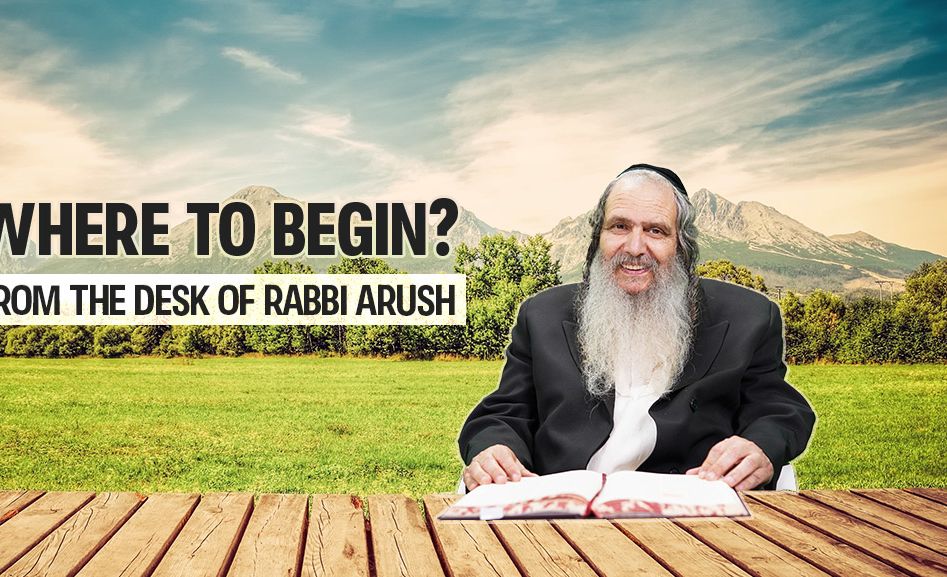
Be Straight with Hashem
Hashem isn't upset with a person who's having trouble guarding his eyes or overcoming any other bad habit, as long as the person doesn't try to fool himself...

Hashem loves honesty. One of the biggest mistakes people make is that in personal prayer, they say cosmetic things that they think Hashem wants to hear, but it doesn't at all reflect the truth of where they're holding at the present. When a person isn't yet making the slightest effort to guard his eyes, how can he roll his eyes to the heavens and say, "Hashem, let me cling to You!" First, he should be straight with Hashem and honest with himself: "Is that my real desire? Then why am I not guarding my eyes?"
Hashem isn't upset with a person who's having trouble guarding his eyes or overcoming any other bad habit, as long as the person doesn't try to fool himself and as long as he's straight with Hashem. Such an individual should say, "Hashem, I have difficulty withstanding this trial and resisting temptation; have mercy on me and come to my aid! My current spiritual level is that I'm easily tempted. To tell You the truth, I wish this transgression were permissible, because in all honesty, I enjoy it. Forgive me, Father – I know You don't want me to continue doing what I do, but at this point in time, it's hard for me to resist. I don't want You to be upset with me, so please help me do Your will. Give me the strength to control myself. Give me a pure heart with pure desires. I know that You're right and I'm wrong, but what can I do? I'm having a hard time, Father – please have mercy on me and help me." Such candor brings Divine  illumination and compassion down to the lowest places. This wonderful, honest individual who speaks to Hashem in this truthful manner is not trying to make an ideology out of his sins and/or bodily lusts.
illumination and compassion down to the lowest places. This wonderful, honest individual who speaks to Hashem in this truthful manner is not trying to make an ideology out of his sins and/or bodily lusts.
Don't be ashamed to confess all your base desires to Hashem, in detail! "Hashem, I am here on this exact level…"
With regular, honest personal prayer, a person develops self-awareness. Once you become aware of your true spiritual level, you will build a sturdy bridge between you and Hashem. The narrow bridge that enables us to traverse this world unscathed is truth. Truth connects us to Hashem. The truth prevents us from falling. An individual experiences extreme difficulty in acknowledging the truth. Rebbe Nachman says, "The whole world is a very narrow bridge – the main thing is not to be afraid." The Rebbe is telling us that we'll be safe on that narrow bridge as long as we are courageous enough to be honest with Hashem and with ourselves.
Indeed, our words of truth carry us over the narrow bridge, as Rebbe Nachman emphasizes (Likutei Moharan I:9), the words of truth are Divine illuminations that connect us with Hashem and illuminate the darkness. Therefore, perfunctory word-of-mouth teshuva is not effective, especially when a person is embarrassed to vocalize what he really feels inside and doesn't admit the truth. The guard at the entrance to the bridge won't let anyone cross unless they have a ticket of truth.
The Rambam says (Laws of Teshuva, Ch. 2) that anyone who confesses without a sincere desire to cease his wrongdoing is like someone who immerses in a mikva with a ritually-contaminating dead rodent in his hand. One cannot purify himself until he casts the dead rodent away. By the same token, if one "vocally" makes teshuva yet still has the desire to sin – or even if he doesn't have the desire to sin but he knows that he'll soon sin again, because he lacks the strength to overcome – then his teshuva is lip service and it won't be at all effective. As long as he fails to separate himself from the impurity, how can he be pure?
One's failure to be honest with Hashem and admit shortcoming locks the doors of teshuva and blocks the path to spiritual gain. For that reason, one must accustom himself to being totally honest with Hashem and to force his mouth to reflect the true contents of his heart. If his heart is still full of lust and lewd thoughts or craving for the forbidden and bad habits, then he must be candid and courageous and admit these things to Hashem. The order of the day is to beg Hashem to help him have the right desires, that his lust and craving should all be for Hashem, just as the prophet says, "Your Name and the thought of You are the soul's delight; my soul desired You in the night, as long as my spirit is with me, I seek You" (Isaiah 26:8-9). May we all merit, amen!











Tell us what you think!
Thank you for your comment!
It will be published after approval by the Editor.